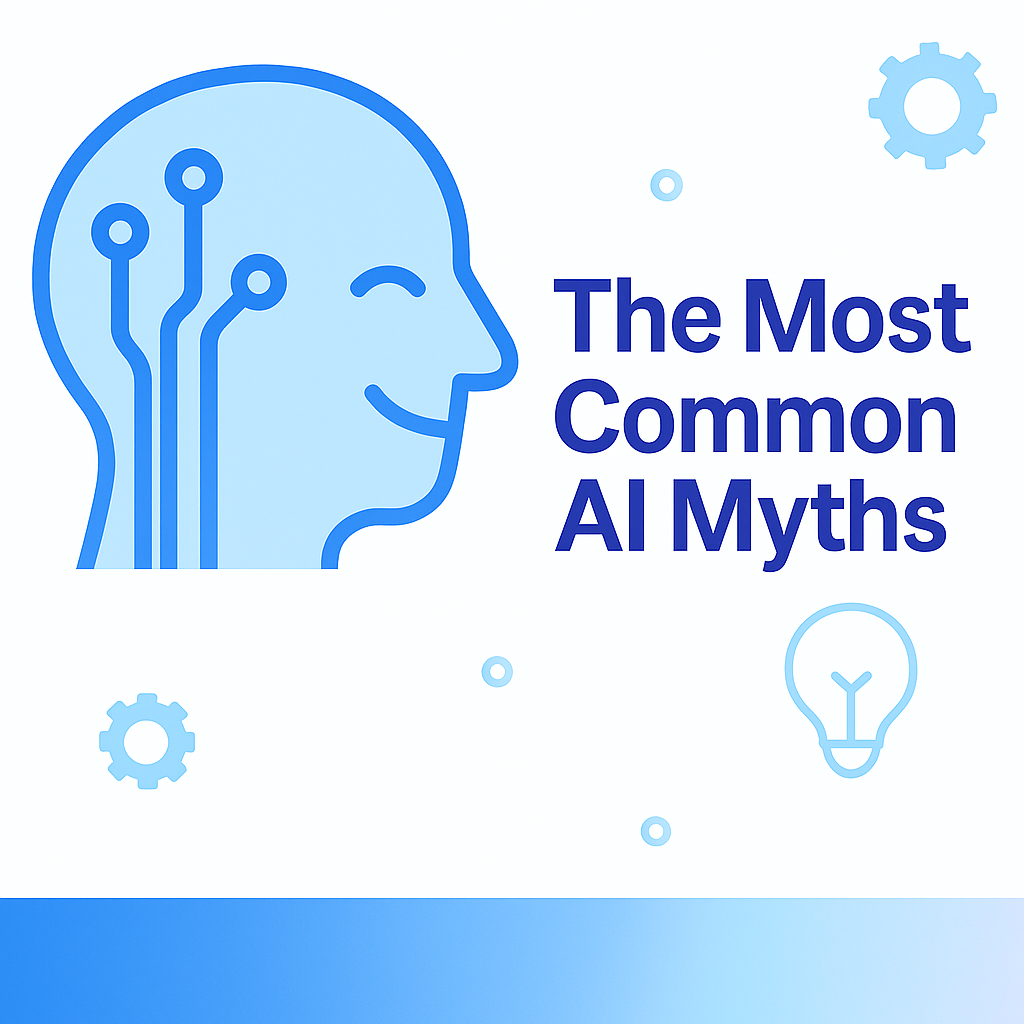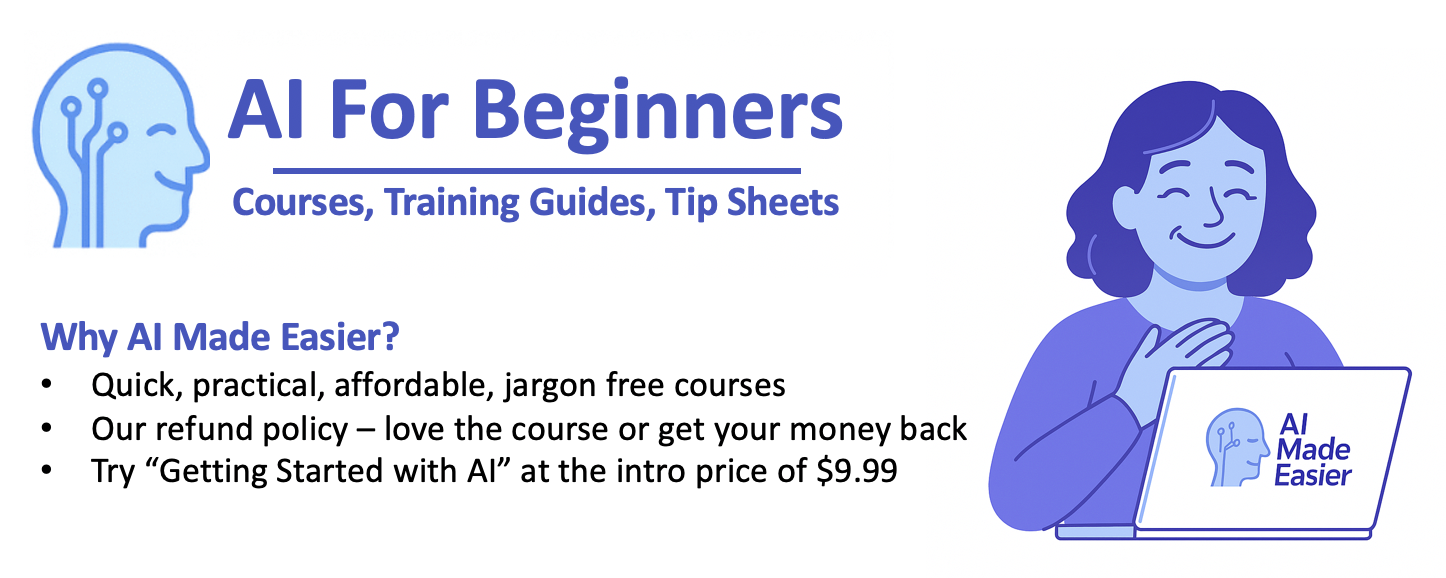🧠 The Most Common AI Myths (and What’s Actually True)

Let’s face it — for something that’s supposed to be smart, AI sure has a lot of drama surrounding it. Will it take your job? Is it spying on you? Will it start writing novels or stealing your Spotify password?
The truth? AI is far less sinister and far more helpful than the headlines (or Hollywood) might suggest.
In this post, we’ll unpack some of the biggest myths we hear about AI — and give you the real story. Think of it as a digital reality check — with a smile.
❌ Myth #1: AI Will Take All Our Jobs
✅ Truth: AI won’t replace you — it’ll empower you.
It’s true that AI can automate some repetitive tasks. But that doesn’t mean it’s coming for your career. Most AI tools today are designed to support — not replace — human workers. They’re here to help you write faster, organize better, and even breathe easier when you’re juggling a million things at once.
AI excels at crunching numbers, sorting data, and generating drafts. You, on the other hand, bring judgment, empathy, originality, and emotional intelligence. In other words, you’re not competing with AI. You’re collaborating with it.
Bonus tip and a quick comment: Instead of worrying about replacement, focus on augmentation. Use AI to level up your productivity, not stress you out. And take it from someone who wants to offload more work to AI, it is a LONG WAY from being able to replace a job holder.
❌ Myth #2: You Need to Be a Tech Genius to Use AI
✅ Truth: If you can write a grocery list, you can use AI.
One of the biggest misconceptions is that AI is only for programmers, engineers, or people who say things like “API” with a straight face. But today’s tools are built for everyone — parents, teachers, small business owners, retirees, and the tech-wary among us.
You don’t need a computer science degree. You don’t need to code. You don’t even need to know what “machine learning” means. If you can type a question or speak into your phone, congratulations — you can use AI. And the more you use AI, the better you will be at asking questions and the better you will be at leveraging AI.
Real-life uses:
- A parent planning healthy dinners for picky eaters
- A teacher creating a quiz with automatic grading
- A freelancer summarizing long emails into short replies
- A retiree using voice commands to manage reminders and to-dos
❌ Myth #3: AI Is Always Right
✅ Truth: AI is smart, but not infallible.
AI can generate impressive answers quickly — but it’s not always accurate. These tools rely on patterns from data, and sometimes that data is incomplete, biased, or just plain wrong. That’s how we end up with confidently incorrect answers like “Abraham Lincoln invented TikTok.” (He did not.) Wait. What?!?!
The fix? Treat AI like a well-meaning intern. Great at first drafts, not so great at final decisions. Always check its work before hitting “send,” “publish,” or “submit.” AI is great at getting you started, so use it in that way.
❌ Myth #4: AI Is Spying on You
✅ Truth: Most AI doesn’t even know who you are.
Let’s clear this one up: AI doesn’t inherently mean surveillance. Most beginner-friendly AI tools — like writing assistants or design generators — don’t store or track personal data unless you explicitly provide it. In fact, some platforms go out of their way to avoid collecting identifiable info.
That said, it’s always smart to use trusted platforms, check privacy settings, and avoid pasting sensitive information into tools you don’t know. But for most people, using AI isn’t any riskier than using a search engine or streaming platform.
Bottom line: AI isn’t following you around the internet with binoculars. It’s too busy helping someone write a wedding toast.
❌ Myth #5: AI Will Become Sentient and Take Over the World
✅ Truth: Today’s AI can’t think, feel, or scheme — and that’s not changing anytime soon.
Science fiction loves the idea of AI becoming conscious, self-aware, and, ultimately, a villain. But current AI isn’t even close to sentient. It doesn’t “understand” the way you do. It doesn’t have desires, goals, or emotions. It just knows how to predict what word or image comes next based on patterns.
So while AI can help write poetry, it doesn’t feel poetic. And while it can mimic humor, it doesn’t know what’s funny. (Which explains why AI-written jokes are… well… mostly groan-worthy.)
💡 Why This All Matters
AI is one of the most transformative technologies of our time. But to truly benefit from it, we need to move past the fear and the fiction.
Understanding what AI is — and what it isn’t — empowers you to use it wisely, confidently, and creatively. Whether you’re using it to simplify your workday, support your family, or explore new ideas, AI can be an incredible sidekick.
And like any tool, it’s not about being perfect. It’s about being useful.
✅ Final Takeaways:
- AI is a helper, not a replacement.
- You don’t need to be tech-savvy to get started.
- Always verify AI’s output — trust, but verify!
- Use ethical tools that respect your privacy.
- Relax. The robot apocalypse isn’t scheduled.
Curious what to try next?
- Purchase Getting Started With AI
- Explore our otherBlogs
- Or just ask your smart speaker to remind you to come back tomorrow 😄
